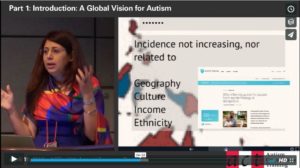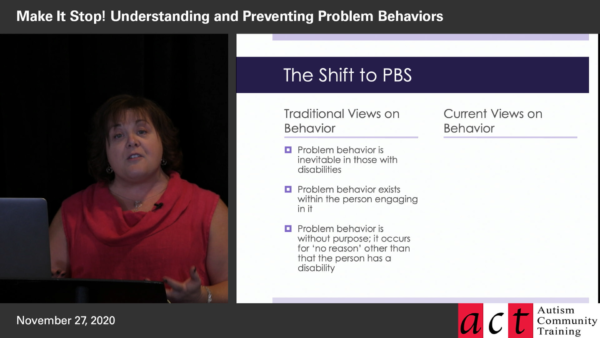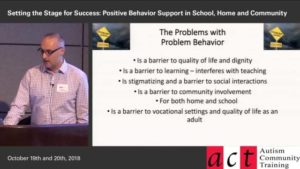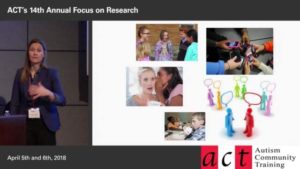From the workshop Applications of CBT to Address Emotional Functioning in Youth with ASD
Jonathan Weiss, PhD, CPsych
Filmed July 24th, 2017
This presentation is part of a free training series developed for mental health clinicians experienced in CBT with an interest in adaptations relevant to neurodevelopmental disabilities (e.g., autism, ADHD, learning disability).
Learning Objectives:
- Recognize common emotional and behavioual problems associated with ASD
- Differentiate mental health problems from ASD symptoms
- Conceptualize common case frameworks that can inform CBT planning
- Consider ethical issues in working with individuals with ASD using a CBT framework – including a panel discussion
About the Presenter

Dr. Weiss’ research focuses on the prevention and treatment of mental health problems in people with ASD and/or intellectual disabilities across the lifespan. He is interested in their health service needs, their emergency service use, and their experiences of psychiatric crisis. Among other research areas, Dr. Weiss is interested in cognitive-behavioural and social skill interventions to promote resilience and improve the mental health of children and adults with developmental disabilities.
Watch Dr. Weiss speak on Thriving in Youth in ASD: What Does it Take? from October 2015.
Session 1
1.1: Case Conceptualization
- What are ‘mental health problems’ in the context of ASD?
- Four generic case formulation components
1.2: Dr. Weiss’ cognitive behaviour orientation
- Dr. Weiss discusses his cognitive behaviour orientation and approaches.
1.3: The 4 P’s
- The 4 P’s in case conceptualization:
- Predisposing: those factors that render an individual vulnerable to a disorder
- Precipitating: stressors or developmental factors that are associated with the emergence or worsening of symptoms
- Perpetuating: factors that maintain the disabling symptoms
- Protective: strengths & assets that may be accessed to promote more healthy adjustment and diminish the severity of symptoms
1.4: Mental health problems in youth with ASD
- Autism in Canada and B.C.
- Relevant conceptualizations: Transactions (Wood & Gadow, 2010)
1.5: Interventions
Session 2
2.1: A Social Cognitive Deficit
-
- Maladaptive processing of self and about non-social environment
- Relevant conceptualizations: Information processing focus (Guas, 2007)
2.2: Mental health assessment decision tree
- Anxiety:
- Separation anxiety
- Specific phobias and the five common types
2.3: Diagnostic overshadowing, baseline exaggeration, cognitive disintegration and differentiating mental health
- Anxiety overview
- Anxiety In the general population
2.4: Anxiety
- Behavioral strategies
2.5: Separation anxiety
2.6: Specific phobias and the five common types
Session 3
3.1: Social anxiety disorder
3.2: Panic disorder & Agoraphobia
- Text here
3.3: Generalized anxiety disorder
3.4: Obsessive compulsive disorder
3.5: Measuring anxiety and OCD
- Screening tools
- Functional assessment
- Dealing with multiple issues
- Emotion regulation skills
3.6: A transdiagnostic issue of emotion regulation – Part 1
- Gross & Thompson’s (2004) process model of emotion regulation
1. Situation selection: The control we exert over the situations we choose to go into
2. Situation modification: Altering situations to address emotional responses
3.7: A transdiagnostic issue of emotion regulation – Part 2
- Gross & Thompson’s (2004) process model of emotion regulation
3. Attentional deployment: How we choose to focus or distance our attention on the emotional aspects of a situation
4. Cognitive control: Our thoughts about the situation and ability to handle it
5. Response modulation: Physiological and behavioural ways of regulating emotion once the emotion is felt






